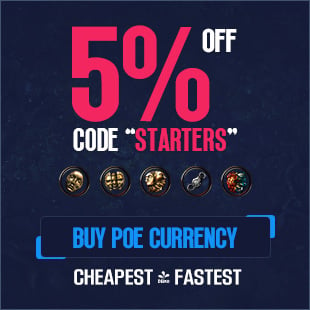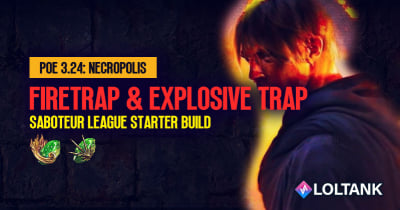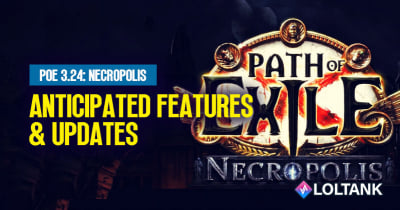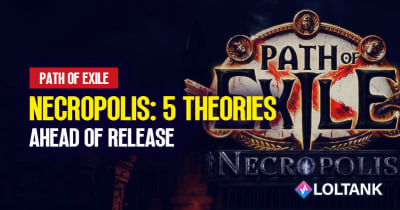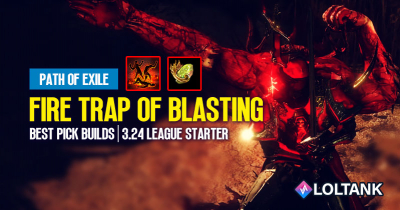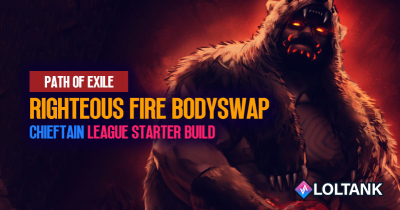Path of Exile Currency Guide: League Mechanic Expedition Farming
- Katrina
- Share
- Path of Exile
- 07/16/23
- 1433
In the vast world of Path of Exile, players are constantly on the lookout for new and innovative ways to amass Poe currency. Through extensive testing and experimentation, We stumbled upon a peculiar method that involves Expedition farming. In this guide, We will walk you through the step-by-step process of utilizing this method to generate consistent profits. Whether you have a Divine orb or prefer a more budget-friendly approach, this strategy has something to offer. So let's dive in and uncover this intriguing currency-making technique!
- About Expedition League mechanic
- Step 1: Acquiring Burial Medallions
- Step 2: Investing in Burial Medallions
- Step 3: Refreshing Danik's Inventory
- Step 4: Assessing the Loot
- Step 5: Expanding the Potential Profits
- Step 6: Evaluating the Results
- Step 7: Iterating and Improving
- Atlas Passives
- Scaling Loot
- Scarabs
- Compasses
- Map Choice
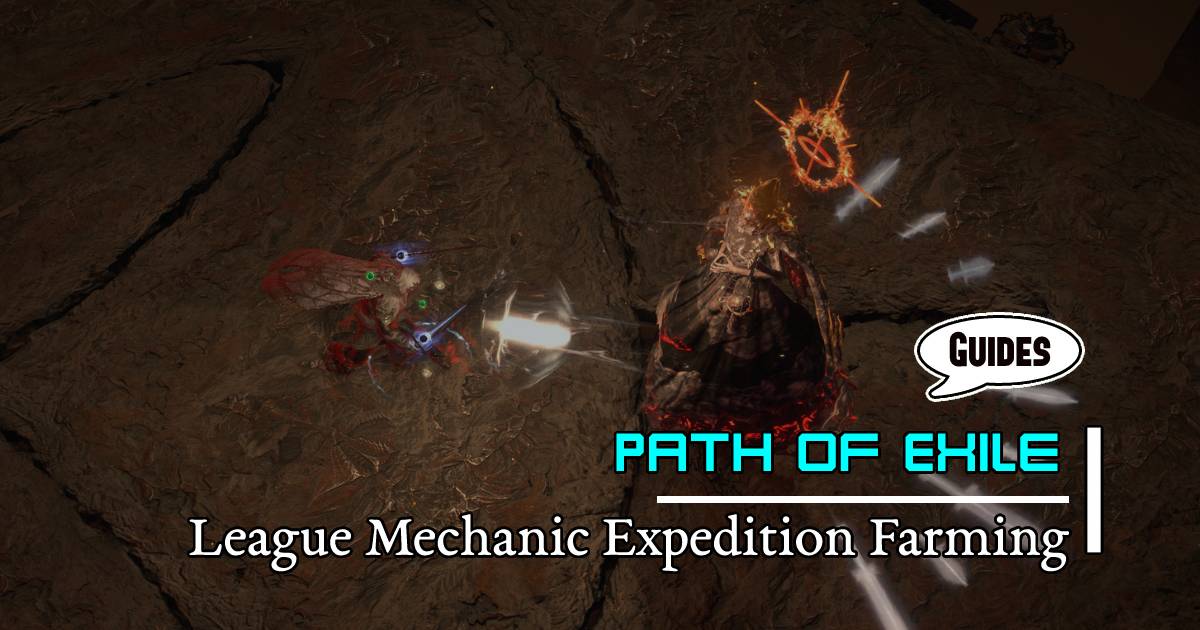
↖ About Expedition League mechanic
Expedition is the league mechanic introduced in Path of Exile's Expedition league, which was released in version 3.15.0 of the game. Players can first encounter this mechanic in Act 6, and it is classified as Extra Content. When exploring non-unique map areas, there is a baseline 8% chance for the Expedition encounter to appear.
In the Expedition league of Path of Exile, players will come across four Expedition NPCs within piles of dirt, skulls, flags, and remnants. These remnants possess modifiers that affect the monsters and loot found in the area. Explosives can be placed in designated areas, with up to four explosives detonating in sequence. Each explosion activates the modifiers of nearby remnants, influencing the monsters and chests found. The player can loot the chests without having to defeat the unearthed monsters. Special Expedition currencies and Expedition Logbooks can also be obtained. The logbooks can be used to access larger Expedition areas with more remnants and loot, including hidden caves behind rock walls that require explosives to access. These encounters may also feature Expedition bosses. After completing an encounter, players can trade their currency with the corresponding NPC on-site or in town.
↖ Step 1: Acquiring Burial Medallions
To initiate this method, you will need a starting balance of at least one Divine orb. Head over to the trade website, Path of Exile Trade (PoTrade), and search for the Danik inventory refresher called Burial Medallions. Alternatively, if you don't have a Divine orb or prefer not to spend money on medallions, you can opt for running Expedition logbooks focused on Knights of the Sun. Keep in mind that this approach will require more time but will yield similar results in the long run.
↖ Step 2: Investing in Burial Medallions
Once you have acquired the Divine orb or Chaos orbs for the trade, make the exchange on PoTrade. At the time of Article, one Divine orb allowed me to purchase 23 burial medallions. Once the trade is complete and you have your medallions, it's time to move on to the next step.
↖ Step 3: Refreshing Danik's Inventory
Rolling Danik's inventory is the core aspect of this method. Since we start with 23 burial medallions, there's a chance you might run out of Sun artifacts during the purchasing process. However, you can always replenish these artifacts by running logbooks that contain Knights of the Sun or by buying inexpensive logbooks on PoTrade. It's important to note that obtaining the desired items from the inventory refresh is not guaranteed, but fear not, as there are still profits to be made.
↖ Step 4: Assessing the Loot
After rolling the inventory with your medallions, take note of the loot you obtain. The main items to look out for are scrap metal, exotic coinage, and logbooks. In my test run, I managed to gather 24 scrap metal and 24 exotic coinage. At the time of recording, scrap metal was valued at one chaos each, while exotic coinage fetched approximately seven chaos each. This totals to 24 chaos profit from scrap metal and 168 chaos profit from exotic coinage, bringing your total profit back to the initial investment of one Divine orb.
↖ Step 5: Expanding the Potential Profits
If you decide not to sell the inventory refreshers, there's an additional step you can take to maximize your gains. Take the 24 exotic coinage you acquired and head over to Tujen. Here, you can roll for various valuable items such as currency, essences, gems, and catalysts. It's worth mentioning that hitting high-value items like Divine orbs or Prismatic catalysts can significantly impact your profits.
↖ Step 6: Evaluating the Results
In my run-through, I rolled the 24 exotic coinage and obtained a range of valuable items, including maps, essences, stacked decks, gems, Harbinger orbs, catalysts, annulment shards, fusings, orbs of regret, fossils, and raw chaos orbs. Calculating the rough estimates of the values, the total worth of Tujen's inventory and the 24 scrap metal amounted to 204 chaos orbs. Although this run did not yield a substantial profit, it showcases the potential of this method.
↖ Step 7: Iterating and Improving
To continue this currency-making method, you can purchase another 23 burial medallions and repeat the entire process. Alternatively, you can invest the chaos orbs earned to acquire more logbooks on PoTrade, increasing your chances of encountering bosses and obtaining additional medallions from chests. Remember, bosses have the potential to drop 10 to 13 medallions, enhancing your overall profits.
↖ Atlas Passives
- Hunt for Answers: A must-have passive for any strategy that doesn't guarantee an Expedition encounter.
- Ancient Decay: Not considered worthwhile for its 4-point investment, as it only minimally reduces the encounter's challenge.
- Ancient Writings: An incredibly powerful node that should be included in all Expedition strategies. It increases the number of Remnants and modifiers, enhancing your chances of obtaining better options.
- Distinguished Demolitionist: Additional explosives allow you to access important remnants and break more Runic Monster markers, resulting in increased rewards.
- Buried Knowledge: Grants increased logbook drops from Runic Monsters and more Runic Monster markers, synergizing well with Ancient Writings.
- Rather Not: This node is suitable for players interested in engaging with Rog's crafting mechanics, particularly in the early league. It's advised to prioritize chances of encountering Tujen and Dannig instead.
- A Noble Quest: An essential inclusion in all Expedition strategies, as Dannig is the most valuable Vendor to encounter.
- Scratchin' up the Ground: Tujen provides substantial currency rewards and offers the opportunity to sell Exotic Coinage in bulk for profit. Always prioritize this node if possible.
- Lucky Guess: Gwennen provides the chance to gamble for rare unique items. However, this node may not be worthwhile unless you're willing to sacrifice potential rewards for the gamble.
↖ Scaling Loot
- Increased Item Quantity: Increases the total number of Artifacts and Vendor Refresh Currency dropped from Expedition monsters. This strategy scales well with Quantity.
- Increased Item Rarity: Item Rarity has no significant impact on Expedition profitability.
- Increased Pack Size: Highly valuable for Expedition, as it increases the number of Runic Monsters, Logbooks, Vendor Refresh Currencies, and regular mob drops.
↖ Scarabs
- Rusted Expedition Scarab: The cheapest method to guarantee an Expedition Encounter but provides no additional benefits.
- Polished Expedition Scarab: The staple option for players, granting an extra explosive and more Runic Monster markers.
- Gilded Expedition Scarab: Offers the same bonuses as the Polished version but with an additional 25% increased Runic Monster Markers. The jump in price may not always be worth it.
- Winged Expedition Scarab: Primarily used in group play due to rarity and low supply. It adds an extra suffix to remnants, but it's challenging to evaluate its worth due to limited explosives available for Runic Monster Markers.
↖ Compasses
Using sextants on your Maps and utilizing Surveyor's Compass to seal valuable rolls for trade can be profitable. The notable Your Maps contain 100% increased number of Runic Monster Markers is highly desirable and commands a high trade value.
↖ Map Choice
Recommended Maps for running Expedition include:
- Dunes Map: Open layout, easy boss access, reasonable monster count, and Acclimatisation divination card for Orb of Alterations.
- Jungle Valley Map: Open layout, synergizes with Eldritch Altars, high investment strategy, and potential for Quantity and Rarity affixes.
- Cemetery Map: Similar to Dunes in layout, but Expedition spawns may be suboptimal. However, it drops Brother's Stash.
Conclusion:
By following this odd yet intriguing method, you can delve into the world of Expedition farming and generate consistent currency in Path of Exile. Remember to adapt the strategy based on your build level, starting balance, and Atlas skill tree. Experiment, tweak, and discover your own unique variations to optimize your profits. I hope this guide has shed light on a lesser-known currency-making technique and aids you on your path to greatness in Wraeclast. Happy hunting, Exiles!
Most Popular Posts
- Poe 3.21 Builds | Crucible League Starter & EndGames Builds
- Top 5 Best Ways to Get 6-Link Easily and Efficiently in POE 3.21
- PoE 3.21 Boneshatter Juggernaut League Starter Build
- POE 3.21 Arc Lightning Hierophant League Starter Build
- POE 3.21 Ultimate Forged Frostbearer Raise Spectre Necromancer Build | 100+M DPS
- How to Succeed in Path of Exile Ruthless Mode?
Popular Category Lists
- Path of Exile / (873)
- Diablo IV / (702)
- Runescape / (344)
- New World / (172)
- WoW Classic SoD / (171)
- Guild Wars 2 / (159)
- Elder Scrolls Online / (138)
- FFXIV / (135)
- World of Warcraft / (65)
- WOW Classic / (43)
- Elden Ring / (40)
- Throne and Liberty / (36)
- SWTOR / (35)
- Albion / (35)
- Last Epoch / (32)
- League of Legends / (30)
- Dark and Darker / (28)
- Fallout 76 / (27)
- WotLK Classic / (23)
- Genshin Impact / (22)





 0
0
